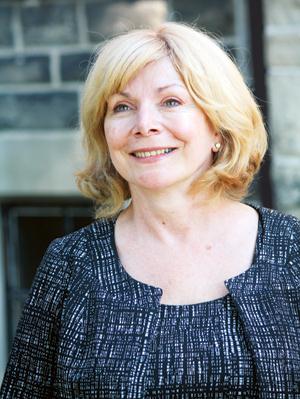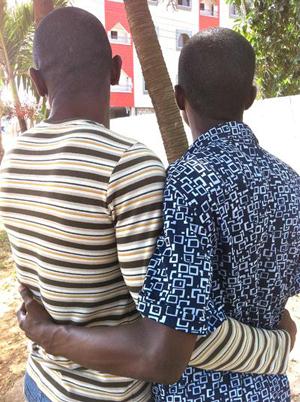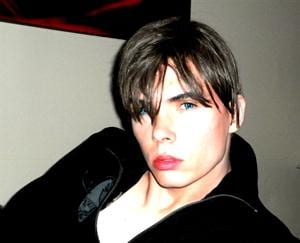
Cheri DiNovo.

Queer refugees. Credit: Paula Stromberg
Luka Magnotta
Luka Magnotta, the darkly captivating alleged serial murderer, first surfaced as a suspected kitten-killer posting videos of his grisly cries for attention on the internet.
Then in May, severed limbs were sent to the offices of Canadian political parties. Later, a horrifying video emerged depicting the killing and dismembering of Concordia University student Lin Jun. At about the same time, Magnotta fled the country, becoming the subject of an Interpol Red Notice and prompting an international manhunt.
Magnotta’s story involves an extensive trail of empty self-promotion (at least 70 Facebook pages under different names), porn performances and videos depicting animal cruelty. The world waited breathlessly for police to track him down.
The Toronto-born man now faces a first-degree murder charge to which he has pleaded not guilty. His preliminary hearing is slated to begin in March 2013.
The story drew international attention, even prompting the Chinese government to release a warning to tourists travelling to Canada.
Meanwhile, Xtra’s online coverage of the Magnotta case was the most viewed of any stories on our website all year. Indeed, the Magnotta story is now the third most viewed story of all time on xtra.ca.
Cheri DiNovo
Ontario is a more free, just and welcoming place because Cheri DiNovo sits at Queen’s Park. And 2012 was quite a year for the long-time NDP MPP.
This year DiNovo shepherded two major pieces of legislation through provincial parliament that ensure safer schools for queer youth and fundamental human rights for trans people.
Toby’s Act, which she first introduced in 2007, guarantees protections for “gender identity” and “gender expression” in the Ontario Human Rights Code.
It took four attempts, but the bill finally received all-party support this year. Its passage marks a tidal change for the trans movement in Canada. DiNovo says it’s an acknowledgment that trans people face the highest rates of suicide and poverty of any marginal group, and they deserve explicit protections in the law.
“It gives me hope,” DiNovo said at the time. She now hopes to see similar bills in each province and at the federal level.
DiNovo was also instrumental in the passage of Bill 13, the Accepting Schools Act. She fought for clear language that gives students the right to start gay-straight alliances (GSAs) and call them whatever name they wish.
During committee hearings for the bill, DiNovo and MPP Peter Tabuns did not let homophobia go unchallenged. The NDP MPPs stood in solidarity with students, who often found themselves the target of anti-gay religious vitriol.
In September, DiNovo celebrated 40 years of activism with a party at the Boulevard Club. In the 1970s, a young activist at the time, she added her name to the “We Demand” petition, a manifesto on gay rights, which was taken to Parliament Hill in 2011.
DiNovo has been fighting for lesbian, gay, bisexual and trans rights since the beginning of the gay liberation movement. She attended the first gay picnic at Hanlan’s Point in 1972, which became the first ever Toronto Gay Pride. This year Pride Toronto also honoured DiNovo, naming her co–grand marshal of its annual parade.
Queer refugees
This year we wrote often of the struggle faced by queer refugees fleeing persecution in some of the world’s most homophobic countries. These brave people take great risks to fight for the right to live and love freely.
Disturbingly, 2012 is also the year Canada took steps to make that increasingly difficult for them. Changes included in Bill C-31, an omnibus bill on Canada’s refugee system passed by the federal government, increase the likelihood that gay asylum seekers will be rejected, deported or imprisoned.
Under the new system, refugees from Immigration Minister Jason Kenney’s 23 designated “safe countries” — to be revealed Dec 15 — will be stripped of their appeal rights and their cases will be fast-tracked and heard within 30 to 45 days.
This makes it especially difficult for queer refugees who need to build their cases and essentially prove that they are gay and under threat of violence. Refugees are also ineligible for healthcare coverage under the new rules, even in medical emergencies.
Experts says Bill C-31 is a frightening package that chops away our country’s safety net, ensuring that people will inevitably fall through the cracks and return to imminent danger, even death.
In the 2012 documentary Last Chance, a look at the harrowing journey of five queer refugees seeking safe haven in Canada, Peter Showler, former president of the Immigration and Refugee Board of Canada, says the government’s message to refugees is clear: “You’re not welcome in Canada.”
“Historically, Canada has been widely recognized throughout the world as the model where refugees do have a fair chance to tell their story,” he says. “With this new system there are far more who really just don’t get the chance to tell their story. The result of that is eventually more people will return to persecution.”
Internationally, there are still 80 countries with criminal sanctions against queer people and eight countries in which homosexuality is punishable with the death penalty. But far more countries have widespread social discrimination and systemic homophobia that is often supported by the state.
This year, Russia — which will likely make Kenney’s “safe list,” since being gay is technically legal there — has taken steps to criminalize all pro-gay speech and ban gay pride marches. Gay activists are continuously met with police violence — rainbow flags are confiscated and demonstrators hauled away.
And what about Ugandan refugees, like those who bravely spoke to Xtra recently about the imminent passing of one of the harshest pieces of anti-gay legislation in the world? While Uganda will surely not be deemed safe, how will refugees from there prove to Canadian officials they’re gay or lesbian if they have spent their entire lives hiding their sexuality in order to stay safe?
Now, more than ever, the stories of queer refugees must be front-page news.

 Why you can trust Xtra
Why you can trust Xtra


